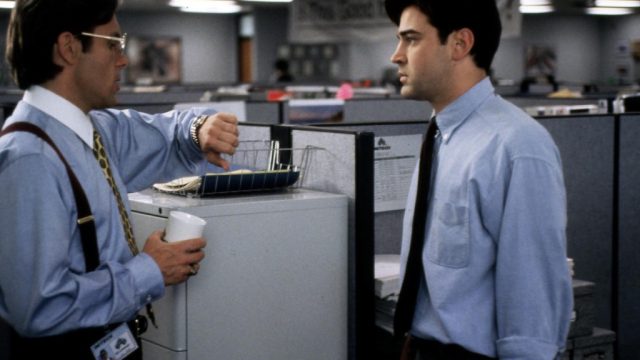20 Subtle Signs Your Boss Wants to Fire You

Few things sting more than getting fired. But, hey, it happens to the best of us. And if you’re currently in a gig in which you fear your employment status is on shaky ground, there’s at least one way you can know for sure: look to your boss.
Have they been avoiding you like the plague? Harshly critiquing every little mistake? Micromanaging your each and every move, right down to what you should or shouldn’t save as a PDF? If any of those ring true, we’re sorry to say that you may be in trouble. So read on to discover all of the surefire signs that your employer is taking steps to either eliminate your position or replace you. And if you want to be sure your relationship with your boss is as strong as ever, learn the 40 Things You Should Never Say to Your Boss.
1
Everything you do seems to annoy them.

Or, in plainer terms, your relationship with your boss has become slightly hostile—without your doing. According to Michael Kerr, an international business speaker, this can mean that any casual interaction with your boss has nearly evaporated because they seem to view you as more of an annoyance than an asset. On your end, it can seem like they’re constantly talking over you and rolling their eyes at everything you do.
2
They begin micromanaging you.

When your boss is preparing to fire you (or even just thinking about firing you), they will often begin to micromanage you because they might feel as though it is the only way that work will be done. At a certain point, it can begin to feel as though your boss is watching your every move, says Lynn Taylor, a national workplace expert and the author of Tame Your Terrible Office Tyrant: How to Manage Childish Boss Behavior and Thrive in Your Job.
3
They completely abandon you.

Or, on the other hand, your boss can completely disappear, according to Taylor. If you’ve lately found your boss to be unavailable for questions and comments about your work, or like they really don’t care at all how well you’re carrying out tasks, then they might be distancing themselves out of guilt or fear of confrontation.
4
There is nothing you do that isn’t criticized.

According to Forbes, along with micromanaging, your boss can also become highly critical of your work. And, even though they point out several flaws with your process, they won’t always tell you how to fix your errors they’ve pointed out to you. Additionally, they may also begin pointing our your flaws to others—which is inevitably bad news for your career.
5
Small talk has evaporated.

When you’ve formed close relationships with the people you work with, including your boss, small talk is a large part of your interaction. Often, according to Forbes, a clear sign that your job is on the line is when this small talk or friendly conversation has essentially disappeared with your superior. When they’re clearly avoiding making friendly conversation, it may point to the fact that they feel guilty about their decision to fire you.
6
They won’t greet you—or smile.

Even the most professional people have trouble firing others—including your boss, says Paul Grossinger, entrepreneur, investor, and public speaker. For your boss, it’s easier to avoid an employee that they are about to fire because lying can cause emotions to surface, like guilt, that they feel is not necessary for the workplace. When they’re avoiding you, they can feel like a greeting is similar to lying to you and assuring you that everything is okay—when it is obviously is not.
7
They begin showing a personal concern and interest in your life.

On the opposite side of the spectrum, your boss can still feel empathy for your situation, says Grossinger. Though it can harm their stance on firing you, they will begin to tune in to their own guilt and ask you personal questions about your family and emotional wellbeing, perhaps to make sure that you’ll be okay after you’re let go from the company.
8
They won’t make eye contact.

Similar to avoiding simple greetings in the workplace, your boss, upon deciding to fire you, will also avoid meeting your gaze to avoid the confrontation that they know will inevitably take place.
“It is very hard, except for the most skilled (often professionally trained) liars to look someone in the eye and lie. So, when your boss knows they may soon terminate you, you will notice less eye contact, less direct engagement, and more ‘proxy’ engagement,” says Grossinger. When your boss uses proxy engagement, he or she is basically having other people deal with you—instead of facing you and perhaps the guilt that they feel.
9
They aren’t available via email or phone.

Not only will your boss be unavailable to speak about your job performance or progress on projects in person, when they begin to feel as though your job is on the line, but they will also often become hard to contact via email or phone. After they’ve already decided that you’re going to be let go, they won’t find it necessary to follow your progress, as most likely your projects and assignments have already been delegated to others, according to Forbes.
10
They attribute your successes to others.

Even after they’ve decided to fire you, your boss may want to ensure that your successes won’t make them feel guilty or unsure of their decision by giving your fellow employees all of the recognition for your accomplishments.
11
When you ask them for feedback, they stall for time.

If you’ve noticed that your boss has been largely unavailable to give you feedback, and you’ve finally reached out to receive much-needed constructive critiquing (as you should!), you might notice that they stall for time. This avoidance of feedback is most likely due to the fact that they don’t want to face the fact that what you’re doing for the company just doesn’t make the grade—and they’re too nervous to make this sort of confrontation before firing you.
12
They don’t listen to anything you say.

After your boss has decided to fire you, they will stop valuing your opinion—or really anything you have to say, for that matter. Your opinions are no longer valid—and they’ve even stopped asking for it altogether. When this happens, your worst fear may have been realized—your boss has completely brushed you aside and no longer cares about your work for the company.
13
They won’t put praise for your work in writing.

When you’re being fired, you may want to point to previously written examples of your good work in order to be able to stand up for all of the hard work that you’ve accomplished for the company thus far. In short, you want to be able to make your case for staying at the company with real evidence from your boss. So, in order to ensure that you can’t reach for these previous examples of praise from your boss, upon deciding to fire you, they will cut this form of communication short, according to Forbes.
14
They maintain a closed off, domineering body language.

According to Pat Mayfield of Yahoo! HotJobs, a boss who is looking to fire you or is behaving in a hostile manner towards you, will often cross their legs and arms, as well as make a point to present a domineering presence by taking advantage of every opportunity to physically tower over you. Additionally, during meetings, they will avoid sitting near you and fail to introduce you to anyone new in the mix.
15
They go to your subordinates first for new projects—not you.

One of the most obvious signs that your boss is about to fire you? When they start handing off your projects to your subordinates, says Robert Dilenschneider, author of 50 Plus!: Critical Career Decisions for the Rest of Your Life. “Most organizations have a chain of command, and when it is disrupted, it is a clear indication that you are no longer needed,” he says. This disruption inevitably means that your boss no longer trusts you with your workload—so your job may be in real peril.
16
They no longer ask for your input on key decisions.

According to Kerr, if you’ve been left out of the most important decision-making meetings, then that points to the fact that your boss no longer values your opinion as it pertains to the business. This, in short, is basically the equivalent of a door being closed in your face—but in a painfully slow fashion.
17
Their door is always closed.

In addition to cutting off communication completely, they will further ensure this closed off persona by keeping their office door shut at all times—especially if they rarely worry about privacy. This might point to the fact that they want no interruption—or confrontation by you.
18
They always disagree with you.

Throughout this process, it’s also important to remember that your boss is still a human being, and while this hostile treatment is unfair, it’s a natural reaction to the environment created by constantly hiring and firing others. So, when they’re constantly disagreeing with you, it may just mean that your boss is attempting to placate their own insecurities about firing you.
19
They never include you in the office banter.

Similar to steering clear of friendly conversation, says Forbes, is your boss’ clear exclusion of your participation in office banter. This pertains to jokes and gossip that involve the whole team—that, in fact, make you a part of the team. When your boss is looking to fire you, they often exclude you from team bonding as they no longer see you as a part of the team.
20
Your HR managers are acting strangely as well.

According to Forbes, when your human resources managers are also acting cold or indifferent to you, avoiding contact at all times, this presents itself as an even bigger indication that you’ll soon be fired from your job. And if you’ve found yourself in a meeting with them about anything other than getting a raise or promotion, take heed, especially if it’s about lagging performance: At many companies, a warning call meeting like this is a base-covering move, to ensure the company won’t justifiably be slapped with a wrongful cause suit down the line. HR, in other words, is the ultimate kiss of death.